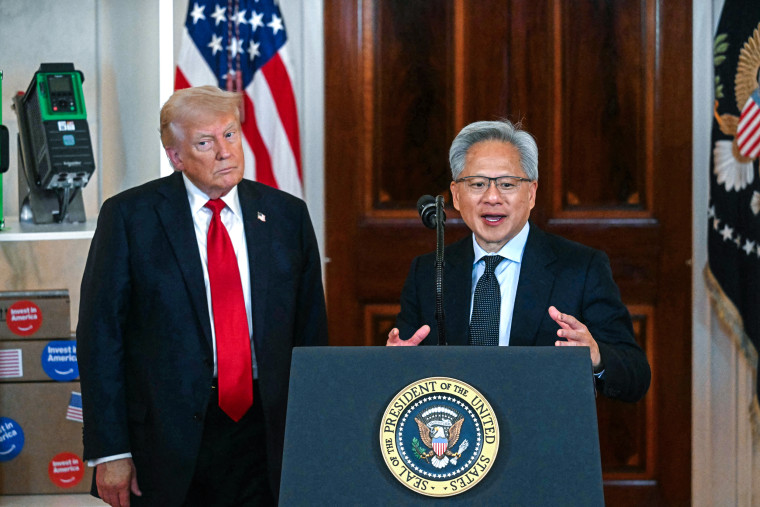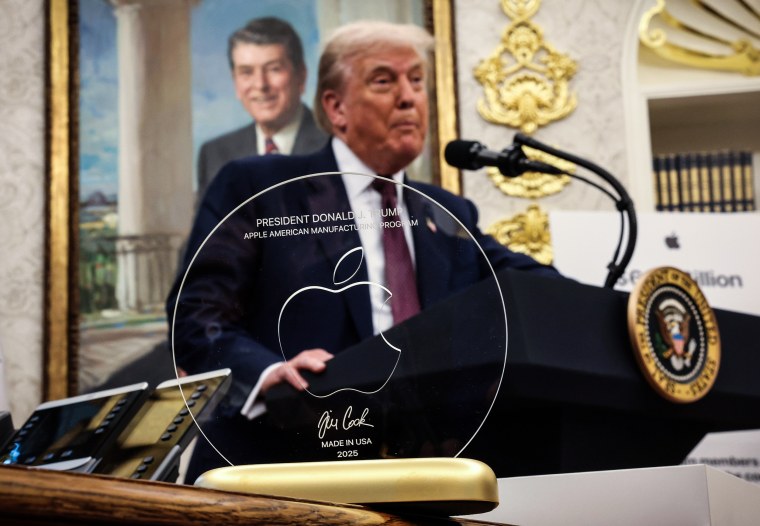Some experts say his interventionist approach to the affairs of investor-owned corporations represents something new — at least in American government, though academics say it has echoes in approaches seen in China, post-war Europe and Singapore.
“In a U.S. context, it’s unprecedented in modern history,” said Ryan Bourne, a chair at the Cato Institute, a libertarian think tank. While Trump was not shy about using his bully pulpit to harangue companies in his first term, Bourne said, carving out firm-specific deals that directly pay the government, calling for the ouster of specific CEOs and dictating how companies should set prices shows that Trump has escalated his willingness to intervene.
“It’s not so much free markets anymore,” Bourne said. “It’s fee markets.”
The stock market appears to be content, too. The broad S&P 500 index has continued setting records, bouncing back from a rapid decline in the wake of Trump’s first major tariff announcement in April.
Even some of Trump’s opponents see the appeal of and the potential for his efforts.
“I incredibly disagree with the guy on almost every issue,” said a progressive strategist, who spoke on condition of anonymity to offer a candid assessment of Trump’s strategy. “He is showing the power of the American presidency and the power of the bully pulpit. Because this isn’t even him passing legislation on this stuff or signing executive orders. This is him tweeting. And it’s not that different than the pulpit that FDR used and Teddy Roosevelt used.”
This person criticized Trump as simultaneously being focused on his own enrichment as president, including through newly formed crypto companies. But this person added that Democrats could take a page out of Trump’s strategy in regard to corporations in the future and “adapt to the changing presidency.”
“I don’t believe he’s actually taking [corporations] on, but if you want to do that, there’s now precedent, and Democrats should do that and not only use the pulpit, but take action when necessary,” this person said. “You can’t go back to normal after this.”
Trump’s direct interventions have picked up pace recently. On Monday, he said he had struck a deal with chipmakers Nvidia — the world’s most valuable company — and AMD to share a percentage of revenues from chips they sell to China with the U.S. government.
“I only care about the country,” Trump said Monday of the agreement. “I don’t care about myself. And [Nvidia CEO Jensen Huang] said, ‘Would you make it 15?’ So we negotiated a little deal.”

Nvidia and AMD did not directly confirm the agreement but said in statements that they hope to revive sales to China.
Trump also secured a “Golden Share” for the United States as part of a merger agreement between U.S. Steel and Japanese conglomerate Nippon Steel. A U.S. Steel representative did not respond to a request for comment.
Media conglomerates Disney and Paramount have also made strategic financial decisions to win more favorable treatment from Trump and his administration. In December, just weeks before he took office, ABC, a Disney company, settled a defamation lawsuit Trump brought against it for $15 million over inaccurate comments made by anchor George Stephanopoulos.
Last month, Paramount, CBS’ parent company, agreed to pay $16 million to settle a separate lawsuit over “60 Minutes’” handling of an interview with Vice President Kamala Harris during the 2024 presidential election season. The settlement came just days before the Trump administration approved Paramount’s merger with Skydance Media.
If there were implicit threats involved in getting those firms to agree to the arrangements, Trump has also not shied away from making explicit warnings. Last week, he called for the ouster of Lip-Bu Tan, the CEO of chipmaker Intel, over allegations that he was too close to China, prompting a last-minute visit to the White House. It seemed to work: By Monday, Trump appeared to reverse himself, calling Tan’s career “an amazing story” and saying his Cabinet and Tan plan to bring unspecified “suggestions” to Trump about how to move forward. On Tuesday, he was already taking aim at another firm, calling on the head of Goldman Sachs to fire its chief economist because of the company’s bearishness on his tariffs.

Two months after Trump threatened to impose tariffs on Apple products if it continued to source products from India, CEO Tim Cook visited the Oval Office last week to pledge billions in extra investments in the United States and give Trump a gold-plated glass sculpture.
An Apple spokesperson did not respond to a request for comment.
Congressional pushback to Trump’s efforts has been light. Some GOP China hawks joined Democrats in attacking the Nvidia and AMD deal, while Sen. Elizabeth Warren, D-Mass., has called for an investigation into Paramount’s settlement with Trump.
But the threat of being attacked publicly by Trump, with midterms one year away, has cast a pall over most Republicans who may have once been inclined to rein in executive powers — and have now seen enthusiastic Trump supporters oust a growing cast of moderate former colleagues.
The fear of reprisals by Trump has also extended to the firms themselves, which appear to be making strategic decisions to forgo any kind of legal challenge to his methods.
It is a short-term calculus that may preserve shareholder value in the short run. But over the longer term, experts say, it degrades the overall business climate.
“Where it can lead is businesses, rather than focusing on creating value, now seek to play footsie with politicians more and more,” said Bourne, of the Cato Institute. “And when you have more firm-specific and industry-specific deals, you end up with a highly complex tax and regulatory code. It makes the economy that much less efficient.”
But the current political and legal climate may essentially be dictating firms’ decisions to comply with Trump for them, said Jeffrey Gordon, a law professor at Columbia University specializing in constitutional and transactional law. Any attempt at litigation would prove time-consuming and could disrupt business decisions, he said — with an outcome far from certain given the Supreme Court’s favorable rulings on Trump’s executive authority.
“You’ve got a president who’s got unknown bounds on his authority and an appetite for battle — the easy thing to do is give in,” Gordon said, “which is what we’re seeing.”
